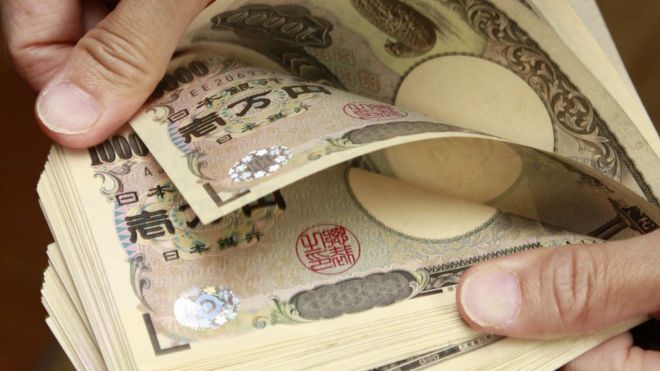In a surprise move, the Bank of Japan has introduced a negative interest rate.
The benchmark rate of -0.1% means that commercial banks will be charged by the central bank for some deposits. It hopes this will be a disincentive to banks to save and prompt them to lend in another attempt to counter the continuing economic slump in the world's third-largest economy.
The eurozone also has negative interest rates, but this is a first for Japan.
It is a move that has been on the cards for Japan's stagnating economy for well over 10 years.
The decision to go negative came after a narrow 5-4 vote at the Bank of Japan's first meeting of the year on Friday.
"The BOJ will cut interest rates further into negative territory if judged as necessary," the Bank of Japan said, adding it would continue as long as needed to achieve an inflation target of 2%.
Some analysts have cast doubt over how effective the rate cut will be.
Why has Japan made this move?
- Japan is currently facing very low inflation, which means that people and companies tend to hold on to their money on the assumption that they can get more for it in future. So rather than spend or invest it, they keep it in the bank.
- Charging a percentage to keep money in the central bank might encourage commercial banks to lend that out. That would boost both domestic spending and business investment.
- It is also aimed at driving inflation up, which is another incentive for people and businesses to spend rather than save.
In a press conference, the BoJ's governor Haruhiko Kuroda said the weakening growth rate of the global economy was the main factor behind the move: "Japan's economy continues to recover moderately and the underlying price trend is improving steadily... further falls in oil prices, uncertainty over emerging economies, including China, and global market instability could hurt business confidence and delay the eradication of people's deflationary mindset."
Earlier in the day, fresh economic data had again highlighted concerns over economic growth. The December core inflation rate was shown to be at 0.1% - far below the central bank's target.
Asian shares jumped and the yen fell across the board in reaction to the announcement. Japanese banks though saw their shares drop on the news as lenders are likely to see their margins squeezed even more.
Download Video and Put Comment
Toa Maoni Hapa Chini




